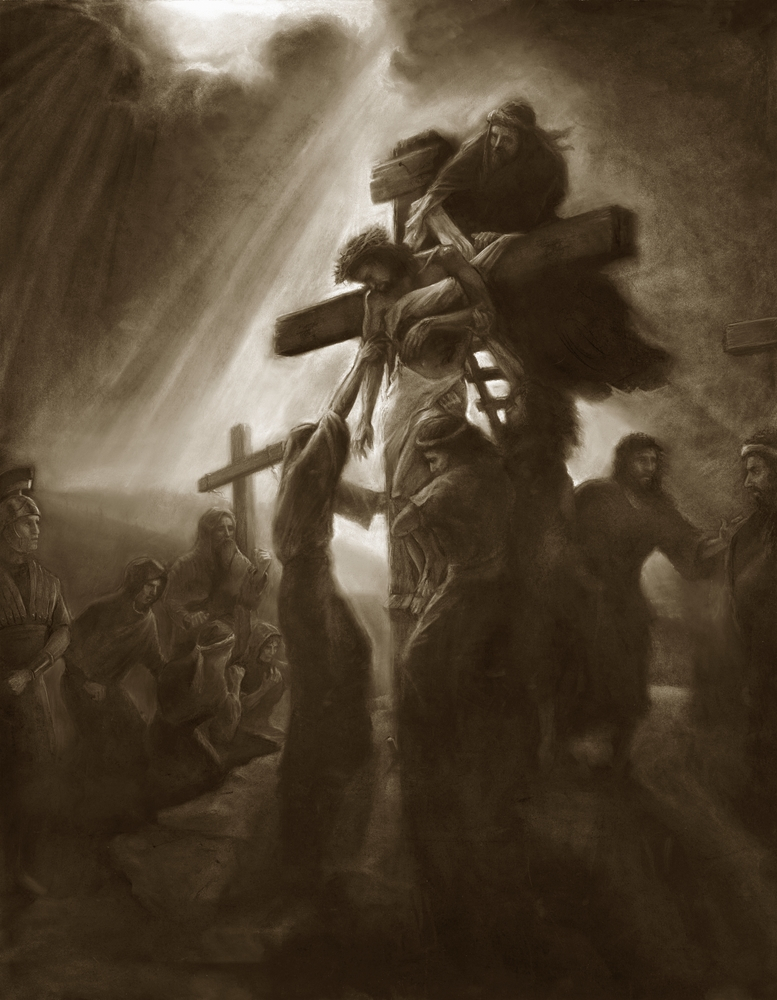This week’s reading is a Sunday school children’s favorite — the story of Zacchaeus, a tax collector who climbs a tree to see Jesus.
“LAUDATO SI’, mi’ Signore” – “Praise be to you, my Lord”. In the words of this beautiful canticle, Saint Francis of Assisi reminds us that our common home is like a sister with whom we share our life and a beautiful mother who opens her arms to embrace us. “Praise be to you, my Lord, through our Sister, Mother Earth, who sustains and governs us, and who produces various fruit with colored flowers and herbs”.
Satire and Blasphemy in the Teachings of a Galilean Sage
Radical religious extremists with a distorted view of Islam commit horrific acts of terror, executing the staff of a small satirical French publication. The satirists had dared to depict the Prophet Mohammed in cartoon caricature; all the while lampooning those misbegotten adherents who in turn regard such irreverent acts as blasphemous. The Western world reacts with outrage and defiance to such an affront. World leaders join a million person protest and unity march through the streets of Paris, chanting “Je Suis Charlie,” in defense of freedom of speech, and on behalf of the publication’s name. While a clear distinction might be drawn between the use of words and the vehement reactions they may incite, more profound underlying questions remain. While anti-blasphemy laws are common in Muslim countries, countless other "secular" countries have laws against the defamation of religion, as well. Once the dust settles and more thoughtful discussion ensues, one might ask what constitutes the differences between hate speech and freedom of expression? This commentary consider s esus' use of what was deemed blasphemous satire, it's intended purpose, and well-known consequences.
Hebrew Scripture’s View of Life after Death It wasn’t until after the Babylonian Exile that the Pharisees accepted the idea of heaven and
For Christians grace is God’s gift of pardon. According to William Barclay the Greek word for grace was originally a military term. When an emperor came to the throne or celebrated a birthday, he would give his troops a donatirim (donation), which was a free gift that they had not earned; it was given out of the goodness of the emperor’s heart. This idea was picked up by the Christian scripture writers when they wrote about the grace of God. Grace is something that is unearned and undeserved – unmerited pardon.
Eschatology is the study of last things, the final events in history, the ultimate destiny of humanity, the end of the world. Major issues in eschatology include the rapture, the second coming of Jesus, the tribulation, Millennialism, and the last judgment. Most of the Christian books I have read do not seriously concern themselves with eschatology, but the Left Behind series of books made it a popular topic. All twelve novels in the series made the New York Times bestselling fiction list – note: the fiction list. Prior to the Left Behind novels of the 1990s, Hal Lindsey’s 1970s bestselling books, including The Late Great Planet Earth, were also bestsellers.
Judas Iscariot, the anti-hero of the story of the crucifixion, has been heaped with scorn and ridicule over the centuries. “Judas” is not used as a child’s name because it became the synonym for betrayal, for being a back-stabber. In Christian art, he is portrayed in dark, sinister tones. Events in western Christian history from the Inquisition in the fourteenth century to the expulsion of the Jews from almost every country of Europe at one time or another, to Martin Luther’s call for the burning of synagogues, to the violence and killing frenzy of the Holocaust in the twentieth century are all rooted substantially in Judas and because he was a Jew, applied to all Jews. Even his name is identical with the name by which the entire Jewish nation was known… Judas is simply a Greek spelling of Judah.
Part One in this series considered the notion of “God,” or “gods,” as the single most elusive idea the human imagination has ever concocted or tried to fathom. But we typically constrain ourselves, thinking only in theistic terms; and fashion our notion of “God” in an anthropomorphic image so we can more easily relate to the idea. We ascribe to such a being all kinds of desirable characteristics that might comprise this composite character. The Christian then proceeds to incarnate that idea with a Christology in which Jesus is typically construed as mediator and chief negotiator; to the extent such a savior is willing to atone for all our wretchedness and secure our own immortality in another existence. It’s all pretty fanciful stuff. But for those progressives for whom such a construct is no longer viable or credible, it is not simply a question of what remains amidst the theological rubble, but what more, or other, might yet be discovered? As such, we ask how we might speak of such things. What language might we use?
It is tattooed on our hearts Etched on the walls at the core of our being There is no escaping the reality And yet we still ignore it
Paul is not talking about life after death. Paul is talking about embracing the challenge of distributive justice-compassion –“the great work” – here and now. John’s Jesus assures us that “the spirit of truth will testify on my behalf,” not about the insane claim that he was God, nor about the resuscitation of a corpse.
We can usefully consider the problem posed by the Bible for theologians and church leaders under three categories: the world behind the text, the world within the text, and the world in front of the text.
Sea Raven juxtaposes recent military events with the Gospel to make an eye-opening point about the cost of retributive justice.
In times of political and economic, cultural and ecological crisis, Jensen asks us to evaluate the risks we are willing to take to work for social justice and ecological sustainability. He discusses his personal experiences and view points of recent political events and presidential actions. Urging us to listen to our own hearts, he calls us speak our truth to defend against evils of established systems, and practice a balance of passion and humility in order to cope and promote positive change.




















